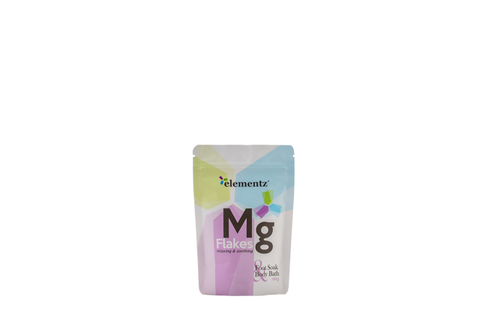In Brief: |
'People who exercise hard have higher magnesium requirements than people who are sedentary – and if levels fall too low, it can be difficult to increase endurance levels.’
When you sweat, you lose magnesium.[1] When you flex your muscles, you need magnesium to relax them. Magnesium plays a big part in keeping you going. When calcium (the initiator of contractions) is present without sufficient amounts of magnesium (the initiator of relaxation) in your body, muscle cramps and a build up of lactic acid can abound.[2]
So how does magnesium have major implications with regard to athletes?
‘People who exercise hard have higher magnesium requirements than people who are sedentary – and if levels fall too low, it can be difficult to increase endurance levels.’[3]
An amazing fact about magnesium is its effect on the neuromuscular system – it provides more energy despite its usual role as a relaxant. If you start taking magnesium, your energy levels will go up as it helps with metabolising glucose and it influences the formation of energy packets called ATP (adenosine triphosphate), which your cells need. Magnesium helps prevent calcium from causing excessive contraction.[4] In other words, magnesium eases your movements.
The higher the intensity of your exercise, the greater your need of magnesium becomes in order to burn glucose for making energy to meet the requirements of your straining muscles.[5]
Whether your exercise regimen is in short bursts or drawn out, adrenalin is discharged and magnesium is moved (mobilized) from your blood to your cells and vice versa. Exercise and the release of adrenalin cause magnesium to move into the body’s exercise-active regions and away from inactive sites. [6] Without sufficient “backup” magnesium, this can be a major issue.
So how does magnesium have major implications with regard to athletes?
‘People who exercise hard have higher magnesium requirements than people who are sedentary – and if levels fall too low, it can be difficult to increase endurance levels.’[3]
An amazing fact about magnesium is its effect on the neuromuscular system – it provides more energy despite its usual role as a relaxant. If you start taking magnesium, your energy levels will go up as it helps with metabolising glucose and it influences the formation of energy packets called ATP (adenosine triphosphate), which your cells need. Magnesium helps prevent calcium from causing excessive contraction.[4] In other words, magnesium eases your movements.
The higher the intensity of your exercise, the greater your need of magnesium becomes in order to burn glucose for making energy to meet the requirements of your straining muscles.[5]
Whether your exercise regimen is in short bursts or drawn out, adrenalin is discharged and magnesium is moved (mobilized) from your blood to your cells and vice versa. Exercise and the release of adrenalin cause magnesium to move into the body’s exercise-active regions and away from inactive sites. [6] Without sufficient “backup” magnesium, this can be a major issue.
'...you should always make sure that your magnesium status is in order before starting any exercise programme.'
Stress from strenuous exercise on a body that is low in magnesium will lead to symptoms of magnesium deficiency manifesting. Furthermore, when magnesium is low, exercise or training can use up the little magnesium that is available and increase your body’s need for magnesium. If your level of magnesium is low enough, a burst of exercise can be the cause of cardiac arrhythmia and even be the cause of sudden death. This can happen to you regardless of your weight or fitness level. Therefore, you should always make sure that your magnesium status is in order before starting any exercise programme. Accurate measurements of cellular magnesium levels are difficult to obtain so the best thing you can do for yourself if you plan on exercising is to supplement your diet with magnesium.
Magnesium is needed for the attachment of mRNA to ribosome and the activation of amino acids which help in the process of making proteins, i.e., protein production depends on optimal magnesium levels. It is hypothesised that low magnesium levels may negatively affect the metabolism of protein, which could result in lowered strength gains in a structured workout regimen.[7]
Exercise can be dangerous for you when your body’s cells are low in magnesium. Exercise stress can be bad as it ‘causes the release of adrenaline and the sudden shift in magnesium from the cells to the blood, further lowering magnesium in cells to dangerously inadequate levels.’[8] Exercise-stress induced magnesium loss is particularly harmful to the heart as ‘magnesium in heart cells is rapidly exchangeable.’[9]
If you haven't already, we recommend including a minimum of 2 magnesium flakes foot soaks or baths a week, and daily applications of magnesium oil or gel to support better energy production, muscle health and performance. This would be part of an ideal routine that includes more nutrient-dense and magnesium-rich foods, adequate hydration, necessary stretches and warm-ups, and last but not least, beauty sleep!
Exercise can be dangerous for you when your body’s cells are low in magnesium. Exercise stress can be bad as it ‘causes the release of adrenaline and the sudden shift in magnesium from the cells to the blood, further lowering magnesium in cells to dangerously inadequate levels.’[8] Exercise-stress induced magnesium loss is particularly harmful to the heart as ‘magnesium in heart cells is rapidly exchangeable.’[9]
If you haven't already, we recommend including a minimum of 2 magnesium flakes foot soaks or baths a week, and daily applications of magnesium oil or gel to support better energy production, muscle health and performance. This would be part of an ideal routine that includes more nutrient-dense and magnesium-rich foods, adequate hydration, necessary stretches and warm-ups, and last but not least, beauty sleep!




